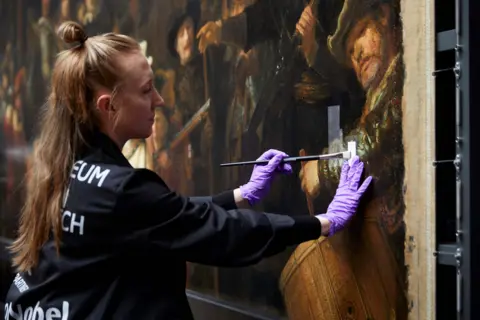
 Getty Images
Getty Images
The largest restoration of Rembrandt's masterpiece, The Night Watch, is under way at the Rijksmuseum, in Amsterdam.
Following five years of research using techniques such as digital imaging and artificial intelligence, eight restorers will begin "Operation Night Watch" by removing the varnish from the painting - in full view of the public, within the glass-enclosed space in The Night Watch Room.
"The start of the restoration is thrilling," Rijksmuseum general director Taco Dibbits said.
"Removing the varnish will reveal The Night Watch's eventful history. It will be a unique experience for the public to follow this process up close.”

 Courtesy of the Rijksmuseum
Courtesy of the Rijksmuseum
The varnish has started to be removed, as part of the first stage
The varnish, applied during a 1975-76 restoration, will be removed using microfibre cloths and cotton swabs.
The process follows years of scientific research, trials on other paintings, and tests on The Night Watch itself.

 Getty Images
Getty Images
The Night Watch is one of the most famous Dutch Golden Age paintings
Made for Amsterdam's Arquebusiers Guild Hall, Rembrandt van Rijn's 1642 oil painting is one of the earliest to portray a group in action.
A captain, dressed in black, is telling his lieutenant to start the company marching. And the guardsmen are moving into formation.
Rembrandt uses the light to focus on particular details, such as the captain’s gesturing hand and the young girl, a mascot, in the background.
The painting’s original name is Militia Company of District II under the Command of Captain Frans Banninck Cocq - but it became known as The Night Watch, in the 18th Century.
The artwork was coated with a dark varnish and accumulated dirt over the years, giving the false impression it depicts a night scene.
Sprayed acid
The Night Watch has been attacked with a knife - in 1911 and again in 1975, when the attacker slashed 12 cuts into the canvas.
And in 1990, a man sprayed acid on to the painting - although, this time, thanks to a guard's rapid intervention, only the varnish was damaged.
The Night Watch has been treated at least 25 times - but this latest research and restoration project is the most extensive so far.
More than two million visitors come to see the painting, at the museum, in the Netherlands, every year.

 Movie
Movie 1 month ago
35
1 month ago
35 



![Presidents Day Weekend Car Sales [2021 Edition] Presidents Day Weekend Car Sales [2021 Edition]](https://www.findthebestcarprice.com/wp-content/uploads/Presidents-Day-Weekend-car-sales.jpg)



 English (United States)
English (United States)